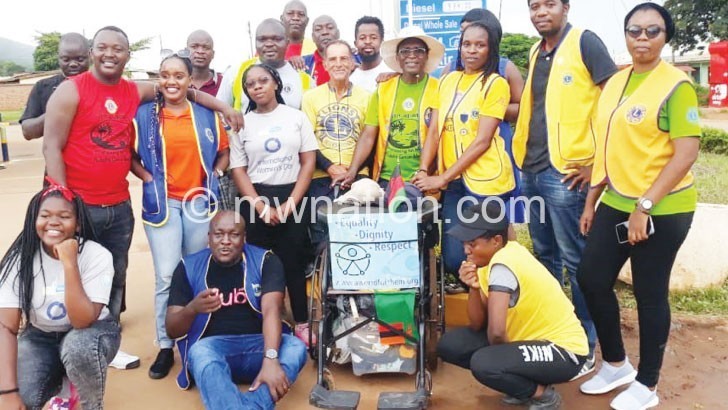Walking for disability rights
A journey of a thousand miles begins with one step, so goes the saying.
Brazilian social activist José Geraldo de Souza Castro, 62, has made his first steps from South Africa to Malawi in a continent-wide tour to raise awareness on challenges faced by persons with disabilities.
Castro will walk more than 17 million steps across Africa, pushing a wheelchair from Kwazulu Natal in South Africa to Alexandria in Egypt.
When asked about the 11 500-kilometre (km) trip, covering 60 km a day, he said: “This is the ‘Walking Africa—A World for Them’ Project, which aims to draw attention to one of the main problems affecting people with disabilities around the world—barriers—and make people more respectful of people with disabilities.”

on arrival in Mchinji
So far, the Brazilian Lions Club member has covered 3 700km in 100 days.
Malawi becomes the sixth country on his way from Lesotho, e-Swatini (formerly Swaziland), Zimbabwe and Zambia.
On Sunday, Castro was welcomed by members of Lions Clubs D412B (Malawi) who held a 12km solidarity walk with him from Mwami Border between Malawi and Zambia to Mchinji Boma.
The Brazilian and lions of Malawi planted trees and visited orphanages.
“There was a lot of excitement and an air of pride and belonging as Lion José interacted with his fellows in service.
“We are honoured to belong to such a big and dedicated group of people who dedicate their time and little resources for the betterment of others,” says Lion Stewart Munthali, who is coordinating Castro’s walk through Malawi.
Castro will exit the country through Songwe Border Post on the way to Tanzania, Kenya, Ethiopia, South Sudan, Sudan and Egypt.
Before he leaves Malawi, he will meet Minister of Gender, Disability, Children and Social Welfare Mary Navitcha and visit the enchanting Lake Malawi in Salima.
During his journey, he has encountered signs of hope and despair.
He recounts: “In Zimbabwe, I was very sad to see animals die on the road side due to lack of food since the country did not receive enough rains.
“Every kilometre I walked, I saw carcasses of cattle, horses, goats and donkeys along the roadside due to lack of rain.”
At least 200 elephants and other wild animals are said to have succumbed to effects of prolonged drought in Zimbabwe’s Hwange National Park and Mana Pools National Park.
On his journey, Castro and host lions have been planting trees to avert harsh effects of climate and visiting communities to confront stigma, discrimination, deprivations and harms faced by children with disability.
He calls for elimination of architectural and social barriers to make the world “more just and humane” for persons with disabilities “in all spheres of life”.
“People with disabilities do not want mercy, but equality, dignity and respect,” he says.
Castro sounds determined to turn the continent’s focus to promoting the capacity of persons with disabilities in workplaces and demolishing barriers to their well-being, rights and contribution.
He says: “I want to encourage local governments to promote awareness programmes on the conditions of persons with disabilities and their rights; raise awareness of respect for persons with physical disabilities; promote at all levels of the educational system respect for the rights of persons with disabilities; and encourage society to reflect on the reality of people with disabilities, thereby contributing to the reduction of stigma, discrimination and marginalisation of people with disabilities.”
Castro said the project aims to remove barriers in public and private buildings, toilets, banks and roads.
The World Health Organisation (WHO) estimates that there are 500 million people with disabilities worldwide. The population constitutes a tenth of the human race.
Castro targeted Africa because 80 percent of them live in developing countries.
He will also focus on persons with intellectual disabilities through the Special Olympics Project. The Games personify a growing belief that given the right instructions and incentives, persons with intellectual disabilities can learn, enjoy and benefit from participating in individual and team sports.
This is Castro’s second visit to Africa. Between May 10 2008 and June 5 2010, he made his first transcontinental trip on a pedal cart, driving through 23 countries in Europe and Africa towards the 2010 Football World Cup in South Africa.
Castro, also known as Zé do Pedal, is a photographer, tourism technician, social activist, environmentalist and cyclist.
His desire to travel around the world began in November 1981 when he cycled from Brazil to Spain to watch the 1982 Football World Cup.
“I imagined and fulfilled the trip, although the Brazilian national team was not very lucky at the competition,” he says.





